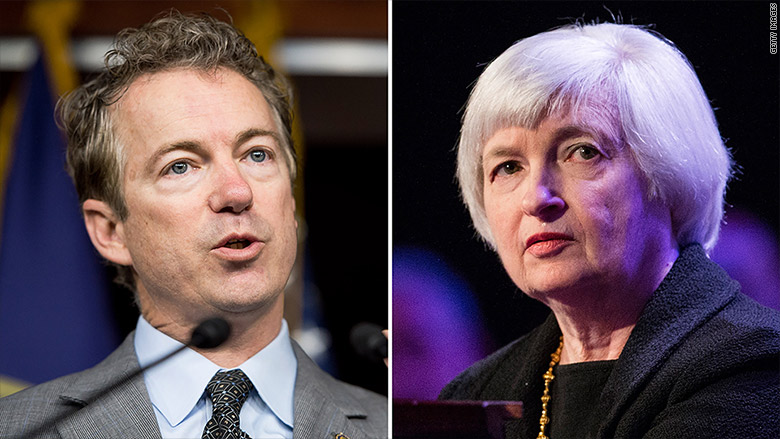
Senator Rand Paul and the Federal Reserve are at war -- at least by Washington political standards.
Paul, a possible Republican presidential contender, has been campaigning to "Audit the Fed." He wants a full review of the financial records of America's central bank -- and its decision making.
The idea is gaining traction on the campaign trail. Paul has raised over $85,000 this week on a website called "Audit the Fed Money Bomb." His goal is $150,000 by next week.
"'Audit the Fed' is about transparency, but the fight is also about restoring fiscal sanity to our nation's checkbook," Paul wrote in an op-ed this week on the conservative website breitbart.com.
The Fed -- and many economists around the country -- are firing back.
"I can think of nothing that would do more damage to our nation's prosperity [than Audit the Fed]," Richard Fisher, president of the Federal Reserve Bank of Dallas, said in a speech Wednesday.
What kind of audit? The Fed is already audited by both the Government Accountability Office and an independent auditor, but Paul wants the auditors to go a step further and identify where the Fed buys its debt -- something they do not examine now.
This isn't about an audit, Fed officials say, but rather a direct attempt to insert politics into the central bank's decisions on interest rates.
It could have a real impact on Main Street since interest rates effect everything from mortgage and car loan rates to how much interest people earn on money they put in the bank.
Related: Alan Greenspan: The euro is doomed
Fisher went as far as to say the only reason the Kentucky senator is bringing this up now is because Congress has failed to do its job to reform the U.S. economy, so the politicians are trying to blame someone else.
"We do our work, they need to do theirs," Fisher quipped.
Rand Paul's new bill: Paul isn't just talking about reining in the Fed. He re-introduced a bill in January that would repeal a law that restricts Congress from immediately questioning Fed policy.
The bill's language is vague, but many take this to mean that politicians would have more influence over the central bank's decisions. The bill would enable Congress' auditing body, the GAO, to question the Fed's decision making. It's unclear exactly how the GAO's potential inquiries would affect the Fed and its credibility.
How much debt does the Fed have? One of Paul's big complaints is that the Fed has too much debt. In order to aid the economy during the Great Recession, the Fed took on over $4 trillion in debt. The central bank says it was necessary to save the U.S., which is certainly better off than Europe now, but it leaves a lot of loans on the books.
"If the Federal Reserve was a real bank, without extraordinary powers, it would be insolvent," Paul wrote in his op-ed.
He also says the central bank is too closely tied to Wall Street.
"Maybe someone should ask about the revolving door from Wall Street to the Treasury to the Fed and back again. Are there any conflicts of interests?" Paul wrote.
Interestingly, one of the Fed's biggest critics on the left, Senator Elizabeth Warren, isn't teaming up with Paul. She wants more congressional oversight on the Fed, but worries Paul's bill would put Congress too close to the Fed's decision making.
Related: Senator Rand Paul goes after Fed...again
Who oversees the Fed? The Fed's meetings are closed to the public. Since the interest rates the Fed sets impact the entire global economy, it's a lot of power for the 12 committee members to hold. Many Republicans say that isn't right.
"There's a real issue here: how do you make the Fed accountable?" says David Wessel, a senior fellow at the Brookings Institution.
Paul puts it bluntly: "It is a disgrace and every citizen in the land should rise up and say, 'We the people are in charge and we demand an audit!'"
The Fed's decision this year on when to raise interest rates is widely expected to be one of the biggest game changers for the stock market and U.S. economy. It's unclear whether Paul's bill would affect when the Fed raises rates if it became law.
Federal Reserve Chairwoman Janet Yellen is strongly opposed to any proposal that would limit the Fed's independence. She and other Fed board members have spoken out against Paul's bill.
In the crossfire of criticism between the Fed and Paul is an important issue: how the Fed becomes more transparent without harming its policies, Wessel says.


